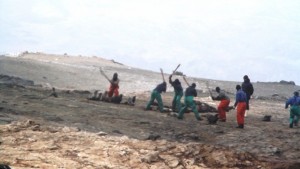“In fact Our Minister of Fisheries has openly asked for conservation groups to suggest more humane methods of killing the seals…and not one suggestion has been made.” The Namibian Permanent Secretary leans back in his chair with a smug look on his face.I’m meeting the Permanent Secretary for Namibia’s Tourism and Environment Ministry, and our meeting is not off to a good start.
I wait a few seconds before replying. “Yes but that’s probably because conservation groups want an end to the seal clubbing…not just a new method of killing.” My words hang in the air, as the man considers me from across the table.
“It is not possible for us to stop the cull. Our goal is to manage all our resources for the best benefit of our people. And that includes the harvesting of seals sustainably. If we stop the seal cull, we lose jobs in this industry. But we also then destroy our fishery because seal numbers will explode.”
I have heard this argument many times in Namiba. If we don’t control seal numbers, they will grow exponentially. To the uneducated it seems logical, however it ignores the fact that seal numbers are controlled by many factors, of which historically, man was not one of them. Other countries that harvested seals in the past and stopped, all found the numbers stabilised. I explain this to the man before me but he seems distant and uninterested.
Eventually he holds up his hand to stop me. “Well thank you for your information. If you have anything else you wish to send me then you have my card.”
I sit there for several seconds before answering. “I don’t think you quite understand the forces that are amassing against you on this issue. Until now your cull has been under the radar internationally. No one really knew about it. But that is all about to change. This year there were at least four groups filming here, and two of them are putting together TV episodes about what an appalling disgrace the seal cull is. These will screen in Europe and North America, and they will portray you in a very poor light. And it will impact you.”
The permanent secretary waves me away in a dismissive manner. “I don’t think it will affect us that much. That is Europe and North America…This is Namibia. It is our business. It is not the business of others what we do with our seals.”
“Look. Most of your tourists come from Europe. Those Swedish and German Backpackers, do you honestly think they will continue visiting your desert, your beaches, your seal colonies, once they find out you kill 90,000 baby seals each year with clubs? Trust me they will be appalled…and where they spend their big fat Euros and pounds is their business.”
Our debate continues for some time. The Minster remains intent on the ruling party line – seal numbers will explode if they are not controlled, and it is the business of Namibia only. While I try and impress upon him that Namibia cannot just ignore the opinions of other countries when their economy is so dependent upon them.
I walk out half an hour later feeling rather despondent. I’m not sure I made any headway with him at all. I’ve flown a long way to have two meetings, and that one was in many respects a waste of time…
